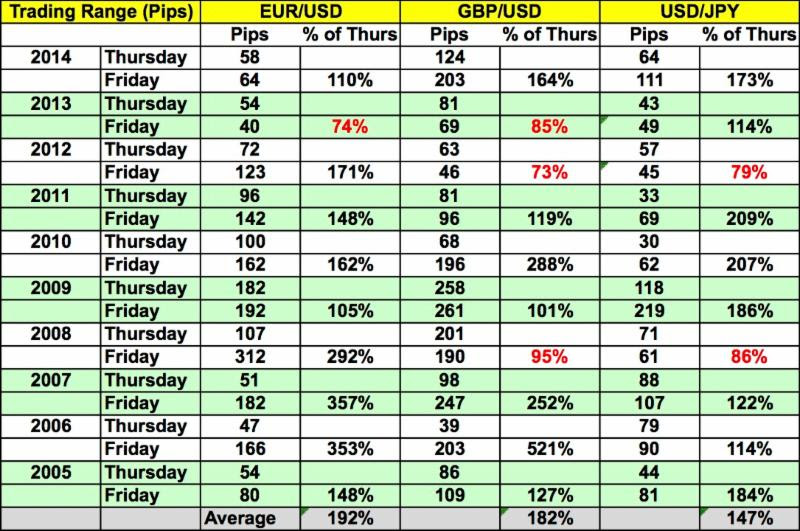By Kathy Lien, Managing Director of FX Strategy for BK Asset Management.
Thanksgiving marks the beginning of the holiday season. For many investors this typically means it is time to start unwinding positions and bank profits before year-end. However this holiday season is very different from others because big announcements are expected in the next 3 weeks that will usher in a new era for monetary policy. The Federal Reserve is poised to raise interest rates for the first time in 9 years and the European Central Bank is expected to increase stimulus. Although both of these decisions have been priced in, investors have not accounted for the guidance that these central banks will provide. We can tell from Wednesday's euro price action that the market is not prepared for a more aggressive move by the ECB. So there's plenty of room for surprises and big moves in the next few weeks. Trading will probably grind to a halt the Friday after the December 16th FOMC meeting. But before then, the historic significance of the moves expected by the ECB and Fed means many investors will remain engaged.
The following table shows how the 3 major currency pairs (EUR/USD, GBP/USD and USD/JPY) performed on Thanksgiving Thursday and on the Friday after. Even though European markets are open, Thursday is traditionally a quiet day marked by tight trading ranges. However in 2007, 2008, 2010 and 2011, the range for EUR/USD and USD/JPY expanded significantly. In other years it was just another quiet day. With only revisions to Q3 U.K. GDP and Eurozone confidence numbers on the calendar, we are not looking for any big moves.

The Wednesday before Thanksgiving generally tends to be interesting. Wednesday for example, EUR/USD dropped below 1.06 to trade at a fresh 7-month low while USD/CHF climbed to its strongest level in 5 years. The decline in the euro was driven by reports that the European Central Bank could resort to unconventional monetary policy that would involve introducing a two-tiered deposit rate. According to the report, large depositors would be charged more than small depositors. This plan isn't likely to receive much support from Germany and France whose banks widely use the ECB's facility. However it is clear from Wednesday's price action that while investors have considered more ECB stimulus, they have not considered how aggressive or creative they will be. As such, we are still looking for EUR/USD to test 1.0520 either before or on the back of next week's ECB meeting.
Despite mostly better U.S. data, there wasn't much consistency in the performance of the dollar. The greenback traded higher versus the euro, yen and Swiss franc but lost value versus the British pound and New Zealand dollar. Personal income grew 0.4% in October but personal spending growth held steady at 0.1%, which was less than economists anticipated. While this is healthy consumer behavior reflective of better savings habits, the Fed may not welcome it because stronger spending is needed to fuel growth. The PCE deflator, an inflation measure, also grew at a slower pace. Durable goods rebounded, jobless claims fell to a 1-month low, service sector activity accelerated and new home sales rebounded sharply. Overall these reports taken together won't change the Fed's plans for monetary policy. No additional U.S. economic reports are scheduled for release this week.
Sterling rebounded against the U.S. dollar on the back of higher home loans. Although U.K. GDP numbers are scheduled for release on Friday, the Brits tend to do a good job of forecasting growth and revisions are unusual. Since the beginning of the year, sterling appreciated between 8% to 10% versus the euro, Australian, Canadian and New Zealand dollars. Not only has the strong currency been putting downward pressure on prices in a low inflation environment but it also hurt exports. The U.K. conducts the majority of its trade activity with the European Union and the recent slide in EUR/GBP means trouble for the economy. Recent developments have been negative for the pound and at this stage the 1.50 level in GBP/USD is looking dangerously vulnerable.
The Canadian dollar held steady versus the greenback despite mixed inventory data. While crude oil inventories were less than anticipated, gasoline and distillate inventories increased. Many economists have been watching the 2 year U.S.-Canadian yield spread, which is rapidly closing in on new highs. However a strong move to the upside for the spread and a slide in oil prices would be needed to drive USD/CAD to a fresh 11-year high above 1.3457.
The New Zealand dollar traded higher versus the greenback Wednesday ahead of the trade balance report. With dairy prices rising in October, economists were looking for an improvement in exports, which should help reduce the trade deficit. However any positive impact on NZD should be short lived because prices fell in November and manufacturing activity weakened according to the latest business PMI index. The outlook for New Zealand's economy remains grim and for this reason we expect the currency's rally to be limited. Meanwhile the Australian dollar traded slightly lower versus the greenback. The recent strength of A$ has been driven entirely by central-bank speak as data including Tuesday night's skilled vacancies and construction work report show slowing activity.
